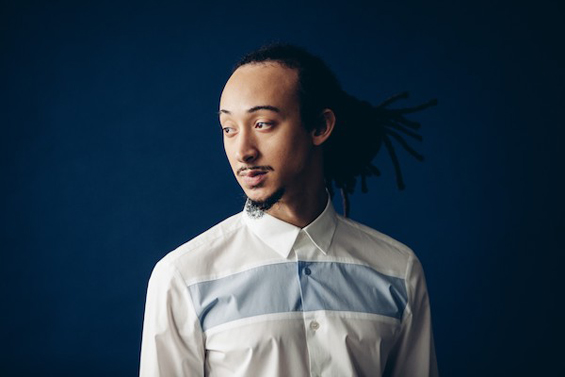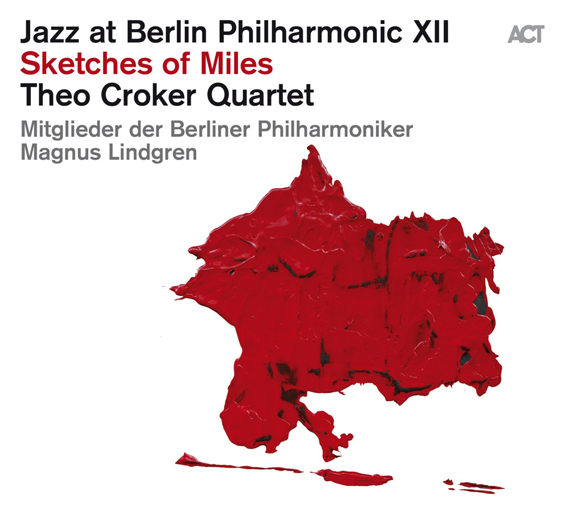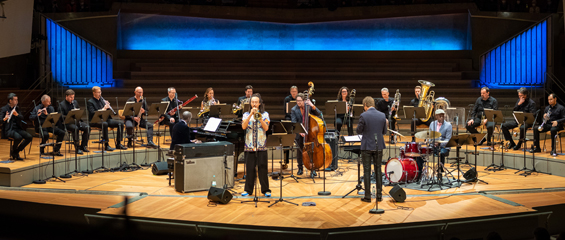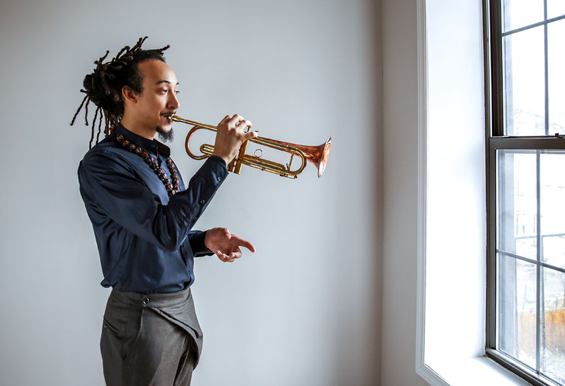

photo: Markus Weidman
FIVE QUESTIONS WITH THEO CROKER
Born in Florida in 1985, Theo Croker has progressively established himself as a jazz trumpeter of significant ability and artistic breadth. That he's the grandson of trumpeter Doc Cheatham is merely one of many special things about the Oberlin College Conservatory graduate and Grammy Award nominee. Helping to broaden his vision was a seven-year stay in Shanghai, which naturally exposed him to new cultural experiences and musical forms. His debut album, Fundamentals, appeared in 2006, followed at regular intervals by In the Tradition, Afro Physicist, Escape Velocity, Star People Nation, Blk2Life/A Future Past, and, earlier this year, Love Quantum. While the latter includes the track “Jazz is Dead,” Croker isn't so much declaring last rites on a particular form than championing music that transcends genre. It's a position in line with his recordings, which have regularly collapsed boundaries between styles and embraced an open-ended, Afrofuturistic aesthetic. It's not uncommon for funk, hip-hop, R&B, and jazz to converge in a Croker production.
He also, however, possesses a deep grasp of jazz tradition, and it's this that's showcased on his just-released live collection Sketches of Miles, the twelfth chapter in ACT's ‘Jazz at Berlin Philharmonic' series (reviewed here). During the recording's first half, Croker, pianist Danny Grissett, double bassist Joshua Ginsburg, and drummer Gregory Hutchinson perform selections from Miles's pre-1970 catalogue; in the second, the quartet's joined by members of the Berlin Philharmonic Orchestra and conductor Magnus Lindgren for suites based on Miles Ahead, Sketches of Spain, and Porgy and Bess. This all-acoustic project, a one-night-only concert recorded at Philharmonie Berlin on 27 November 2021, might seem like something of a departure when viewed in the context of Croker's other recordings, but as the interview that follows clarifies he sees it as simply one more part of a larger interconnecting mosaic. textura recently spoke with the trumpeter about the new release and how it came into being.1. That the concert your quartet, the Berlin Philharmonic Orchestra members, and Magnus Lindgren delivered on November 27th, 2021 was a one-off makes the outcome all the more remarkable. The level of cohesiveness and connectedness achieved in the performances is amazingly high for a single-concert presentation. I'd like to clarify, first of all, how this event came about. Did Siggi Loch, the curator of the 'Jazz at Berlin Philharmonic' series, approach you about participating in the concert or was it something you heard was in the works and then went after? And how much pre-concert planning and rehearsal went into the project?
Yes, Siggi approached me. I did a tour he organized in 2019 with Benny Golson, Émile Parisien, and some other great musicians, and that's when I first met him. And when we were on that tour, I had talked about wanting to work with orchestras, and I think that gave him the idea to do the Miles tribute. He mentioned it to me a few months later, and following a delay because of the pandemic, we did it in late 2021.
As far as pre-concert planning goes, I believe we did one or two days of rehearsal with the orchestra, and that was it. The quartet, we maybe rehearsed for half an hour, just intros and tunes to all be on the same page with chord changes, but it was my intention not to rehearse the quartet section, which I didn't even know was happening until two days before the show. So that's pretty much how it went. I mentioned to Siggi my desire to play with an orchestra, and then he came to me with the concert idea and the plan for a live recording, which I'd never done before. But it turned out fantastic.

photo: Geordie Wood
2. When I interviewed saxophonist Daniel Rotem a few months ago about Wise One, his recent homage to John Coltrane, I asked him how he managed to avoid being drawn into imitating the legend's playing style and hold onto his own sound when Coltrane's influence is so towering. In a similar vein, how did you deal with the challenge of avoiding mimicry and imposing yourself on Miles's material, given the massive shadow he casts on jazz trumpeters? The very idea, for example, of tackling “My Funny Valentine” when Miles's version is so iconic would have daunted many a trumpeter.
Well, to answer your question honestly and simply, I'm not Miles Davis, so it's very easy for me to not be Miles Davis. Again, this concert wasn't intended to be a tribute to Miles, it was simply my interpretations of some of that iconic material. For me, “My Funny Valentine” is a song I love to play and have always loved to play, even before I was aware of the Miles version. While I avoid comparisons and imitations of artists because I truly am myself and truly believe in being myself, I do also take inspiration from Miles, the way he'd leave space, the way he'd play such a strong melody, the way he'd sometimes completely oppose the band he was playing with in order to spur a reaction—those are the things I take away from him. I also feel a spiritual connection to him; he's been present in my dreams like other ancestors and spoken to me. So no part of this was me imitating Miles, just me being myself.

3. I want to ask about your choice of material for the concert. Naturally, the suites are treatments of the three best-known collaborations between Miles and Gil Evans, and it doesn't surprise that two of the other selections are from Kind of Blue. But as the most recent piece in the set, Wayne Shorter's “Pinocchio,” comes from the 1968 album Nefertiti, all of the material performed at the concert predates Miles's pre-electric period. Why did you choose these specific pieces for the quartet half of the concert, and is there a reason why material Miles created after the end of his second quintet wasn't included?
As far as the suites are concerned, they were mostly arranged and decided by Siggi and Magnus. For me it was fun to just show up and play whatever they came up with. As far as “Pinocchio” goes, I love that song and love the way Miles's band played it. As for the other pieces I picked, they just seemed to have a nice flow and be a nice contrast to the orchestral part.
We spent all day deciding what songs to play, and those songs sounded like the most fun and most able to accommodate stretching out as a quartet and really finding each other, because this was a new ensemble for me. Also, some of that material is stuff I would never play otherwise. Songs like “Milestones” and “Footprints” are things I played a lot when I was much younger or more of a student, and I tend not to include those songs in shows I do now. So it was fun and exciting to just revisit something like that with the level that we're all on now. The reason why material Miles created after the end of his second quintet wasn't included is because it was an acoustic concert. There are a lot of other places in Miles's catalog we could have gone into, but that really wasn't my intent. I wanted this to be an acoustic recording and didn't want to dive into the electric things.

photo: Markus Weidman
4. No discussion about this concert event would be complete without noting not only how incredibly you played that night but also your quartet members and the orchestra players. The recording clearly shows that you and your partners were wholly invested in the project and meeting the challenge of honouring Miles's music. Could you say a few words about the contributions pianist Danny Grissett, double bassist Joshua Ginsburg, and drummer Gregory Hutchinson made to the concert? And the members of the Berlin Philharmonic Orchestra who joined you for the suites execute the material terrifically, even better perhaps than one might have anticipated from musicians who play classical material most of the time. How did you and Magnus get the orchestra musicians to swing so well?
As far as the wonderful band goes, Danny Grissett is a beast. His comping and harmonic sensitivity are beautiful and really lead me places. I really don't play with predetermined ideas or approaches so it was really fresh for me to have Joshua Ginsberg also hold it down harmonically and rhythmically. It was a lot of fun playing off of Danny and Joshua, and then of course there's Greg Hutchinson, an amazing drummer who brought a lot of energy, shape, and dynamics to the whole presentation. It was a lot of fun to explore with them, and that's really what the first half of the concert was about for me: exploring where we can go, abandoning where those limits are, and changing tempos and even the rhythm in the middle of a song without discussing it. It's about me feeling them out as an ensemble and all of us feeling each other out together. I'm really grateful they were a part of this.
The Berlin Philharmonic Orchestra members were fantastic, and so kind, patient, and ready to play this music. I felt a lot of enthusiasm from them, especially the trumpeters and everything. We had a lot of fun; it was great to hear them and also inspiring to play with them and in front of them. They were very meticulous and interested in playing this music on the highest level that they could, and Magnus did a great job of leading them through it too. As far as how did we got them to swing so terrifically, I think they came with the intent to swing, and also, when your drummer is Greg Hutchinson, you're going to swing. So that's more than inevitable.

photo: Theo Croker
5. No doubt you'd deeply absorbed Miles's discography long before this 'Jazz at Berlin Philharmonic' project entered your life. Yet in preparing for and then presenting such a concert, I'm wondering if this project changed you and if so in what way. Finally, when the live album's heard alongside the other albums you've released, Star People Nation and Love Quantum among them, and their bold integration of soul, jazz, R&B, and hip-hop, do you see Sketches of Miles as more a departure from your other music or part of an ever-evolving continuum?
Of course, I've absorbed Miles's discography as a fan, trumpet player, and composer, and, yes, for me it was a transformative experience to perform these works with an orchestra and be a soloist. I learned a lot about, you know, vibing with musicians from the classical world, and creating these moods and this show with them was really beautifully done. The project has also inspired me to pull out a lot of the orchestral writing I've done and formulate ideas for some future projects.
For me, it's clearly a part of the continuum; there's no separation in my music. I know one of my goals post-pandemic was to show my listeners and audience that I refuse to be pigeonholed into one thing. So soul, jazz, R&B, and hip-hop elements are as powerful and as connected to playing with an orchestra in Berlin as to playing free jazz with Émile Parisien or being on a rap album with J. Cole. So for me it's all one thing; there's no start or beginning to it, it's really just a journey that's meant to be taken and enjoyed. I'm the same musician in all of these settings, and my goal is to be as appropriate to the setting as possible with my creativity.website: THEO CROKER
September 2022